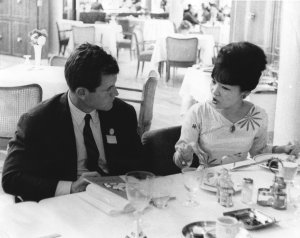Don Fulsome: "This is Don Fulsome, RPI Capitol Hill Correspondent, with a look at a long, but largely unproductive year in Congress.
"Critics called it a 'do-nothing Congress,' and during it first session the 88th did very little about four major pieces of legislation: civil rights, tax reduction, Medicare and general aid to education. Hospital care for the elderly, financed through the Social Security system, languished in a Congressional pigeonhole at year's end. Aid-to-education boosters fared better, receiving at least a portion of their goal. Legislation providing college construction funds, aid to medical schools, expanding the vocational-training program and extending assistance to impacted areas was approved; but the church/state issue still stood in the way of action on aid to elementary and secondary schools.
"To prop up a wobbly economy, the Kennedy Administration early in 1963 proposed a program of tax reduction and reform. Treasury Secretary C. Douglas Dillon spelled out its key provisions.
C. Douglas Dillon: "'We figure that the average tax reduction for all individuals will be about 18%. This will be larger for those in the lower rates. It'll be nearly 40% for those with income under $3,000; between $3,000 and $5,000 it'll be about 28%; and for those in the $10,000 class it will be about 21%.'
Don Fulsome: "An $11 billion bill, retaining most of the recommended cuts, but minus most of the reforms, eventually passed the House, despite Conservative contentions the measure was fiscally irresponsible. Chief House Republican Tax Spokesman John Burns of Wisconsin put it this way.
John Burns: "Our last two Presidents, General Eisenhower and Mr. Truman, told us not to cut taxes unless Government spending is first brought to heel. If in our eagerness for a tax cut we ignore such wise and distinguished counsel, we will be playing Russian roulette with our own destiny."











